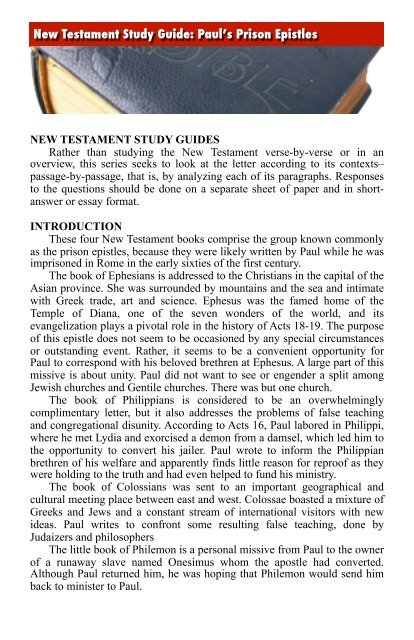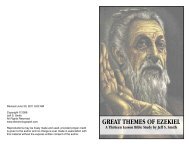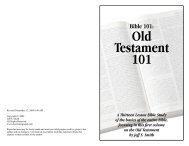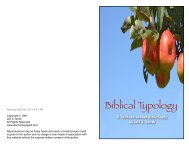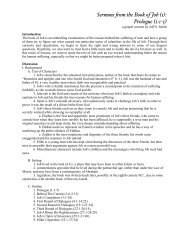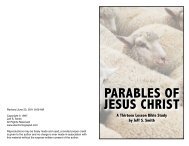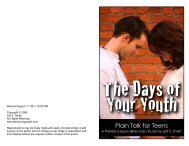New Testament Study Guides - ElectronicGospel
New Testament Study Guides - ElectronicGospel
New Testament Study Guides - ElectronicGospel
Create successful ePaper yourself
Turn your PDF publications into a flip-book with our unique Google optimized e-Paper software.
<strong>New</strong> <strong>Testament</strong> <strong>Study</strong> Guide: Paul’s Prison Epistles<br />
NEW TESTAMENT STUDY GUIDES<br />
Rather than studying the <strong>New</strong> <strong>Testament</strong> verse-by-verse or in an<br />
overview, this series seeks to look at the letter according to its contexts–<br />
passage-by-passage, that is, by analyzing each of its paragraphs. Responses<br />
to the questions should be done on a separate sheet of paper and in shortanswer<br />
or essay format.<br />
INTRODUCTION<br />
These four <strong>New</strong> <strong>Testament</strong> books comprise the group known commonly<br />
as the prison epistles, because they were likely written by Paul while he was<br />
imprisoned in Rome in the early sixties of the first century.<br />
The book of Ephesians is addressed to the Christians in the capital of the<br />
Asian province. She was surrounded by mountains and the sea and intimate<br />
with Greek trade, art and science. Ephesus was the famed home of the<br />
Temple of Diana, one of the seven wonders of the world, and its<br />
evangelization plays a pivotal role in the history of Acts 18-19. The purpose<br />
of this epistle does not seem to be occasioned by any special circumstances<br />
or outstanding event. Rather, it seems to be a convenient opportunity for<br />
Paul to correspond with his beloved brethren at Ephesus. A large part of this<br />
missive is about unity. Paul did not want to see or engender a split among<br />
Jewish churches and Gentile churches. There was but one church.<br />
The book of Philippians is considered to be an overwhelmingly<br />
complimentary letter, but it also addresses the problems of false teaching<br />
and congregational disunity. According to Acts 16, Paul labored in Philippi,<br />
where he met Lydia and exorcised a demon from a damsel, which led him to<br />
the opportunity to convert his jailer. Paul wrote to inform the Philippian<br />
brethren of his welfare and apparently finds little reason for reproof as they<br />
were holding to the truth and had even helped to fund his ministry.<br />
The book of Colossians was sent to an important geographical and<br />
cultural meeting place between east and west. Colossae boasted a mixture of<br />
Greeks and Jews and a constant stream of international visitors with new<br />
ideas. Paul writes to confront some resulting false teaching, done by<br />
Judaizers and philosophers<br />
The little book of Philemon is a personal missive from Paul to the owner<br />
of a runaway slave named Onesimus whom the apostle had converted.<br />
Although Paul returned him, he was hoping that Philemon would send him<br />
back to minister to Paul.


